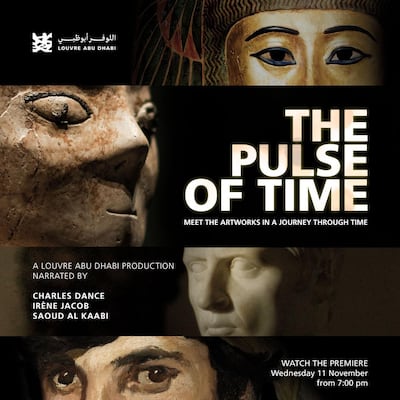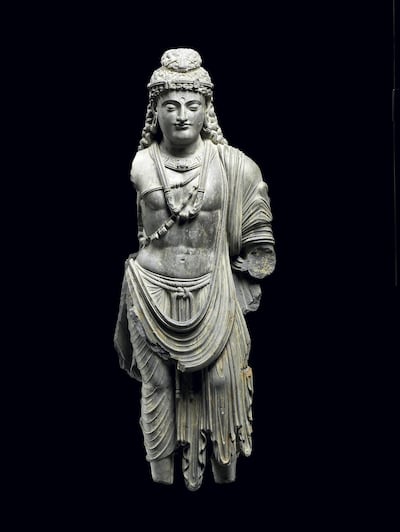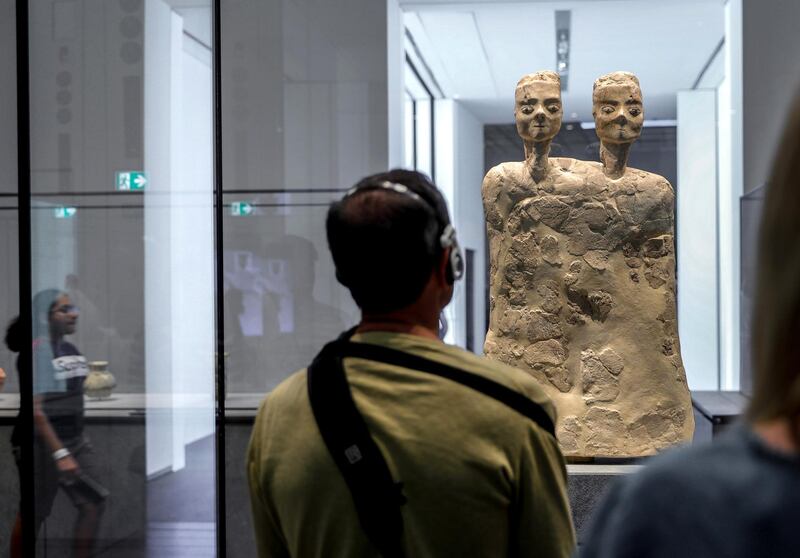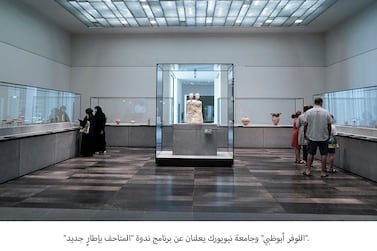Louvre Abu Dhabi is launching a short film that explores the history of human creativity through artworks from the museum’s collection.
Entitled The Pulse of Time, the 40-minute piece is the first short film produced by the museum. It takes viewers on an audiovisual journey through the 12 chapters of the museum's galleries, highlighting a selection of 15 artworks and sharing stories of cultural connections from prehistory to contemporary times.
The Pulse of Time premieres on YouTube on Wednesday, November 11, to coincide with the museum's third anniversary. The short film will be available to stream for free on Louvre Abu Dhabi's website the next day.

The work – directed by Mohamed Somji from Dubai creative studio Seeing Things – will be available in Arabic, English and French. Emirati actor, producer and TV presenter Saoud Al Kaabi, known for his role in City of Life, narrates the Arabic version. British actor, screenwriter and director Charles Dance, who played Tywin Lannister in Game of Thrones, narrates the film in English, while French-Swiss actress Irene Jacob, known for her role in Three Colours: Red, narrates it in French.
"This immersive digital experience encapsulates the current moment as the museum reflects on its third anniversary," Manuel Rabate, director of Louvre Abu Dhabi, says. "The film animates the galleries and objects on view, for an awakening of the imagination that audiences may experience from anywhere in the world."
Rabate says the film marks a new era of original digital commissions alongside traditional physical exhibitions. He explains that the film's "languages and collaborators represent the museum space itself as a crossroads for intercultural connection".
The script was developed by French author and playwright Stephane Michaka, while the film's original score was composed by Jonathan Morali, French songwriter and frontman of the band Syd Matters.
Producers Alexandre Plank and Antoine Richard were commissioned for the film's sound creation.
"Inspired by Michaka's text, we aimed to create an experience that would be a musical epic, an immersive and dreamlike journey through the museum's spaces and works, so that each gallery resonates distinctively in the listeners' ears," says Plank, two-time winner of the Prix Italia international competition for radio and TV, an award that Richard has also won.
"Rhythms evolve and instruments reverberate as the listener traverses different times, civilisations and cultures," Plank says. At the heart of the featured melodies and rhythms are the voices of the narrators, he adds.
“They make the listener a confidant and witness in discovering historical and universal works, and how each of these works tries, in its own way, to weave an invisible link between people and the world around them.”
The Pulse of Time invites viewers to experience a poetic narration of the stories of masterpieces from Louvre Abu Dhabi's collection and those on loan from international institutions.
Cultural commonalities can be discovered in a number of the museum's treasures featured in the film, including the Italian sculpture of a man dressed in a Roman toga called The Orator (100-150) and the Bodhisattva (100-300), a sculpture created in an area that is today part of Pakistan and Afghanistan.

Viewers of the film will also learn of the migration of artistic influence from West to East in the carvings of a basin inscribed with the name Bonifilius (circa 1300) from Northern Italy. Meanwhile a 6,500 BC two-headed statute from Jordan's Ain Ghazal, on loan from the Department of Antiquities of Jordan, allows audiences to see and reflect upon the way the region's ancestors saw themselves.
At a later stage, Louvre Abu Dhabi will launch an audio tour adaptation of The Pulse of Time for visitors to explore at the museum, via the multimedia guide. The audio tour will be available in six languages, with the addition of Mandarin, narrated by actress Lan Qiu, Russian, narrated by actress Dinara Drukarova, and German, narrated by actor Stefan Konarske. The tour will lead visitors through the museum using geolocation technology that triggers audio content and music depending on where a person is situated within the galleries.
The Pulse of Time adds to Louvre Abu Dhabi's roster of digital programmes, which includes the We Are Not Alone podcast by Soundwalk Collective, Anghami's curated playlists of soundtracks inspired by the museum's collection, and virtual exhibition tours, as well as online activities for families and children available on Louvre Abu Dhabi's website and app.
More information on The Pulse of Time and Louvre Abu Dhabi's digital programmes is available at louvreabudhabi.ae.







